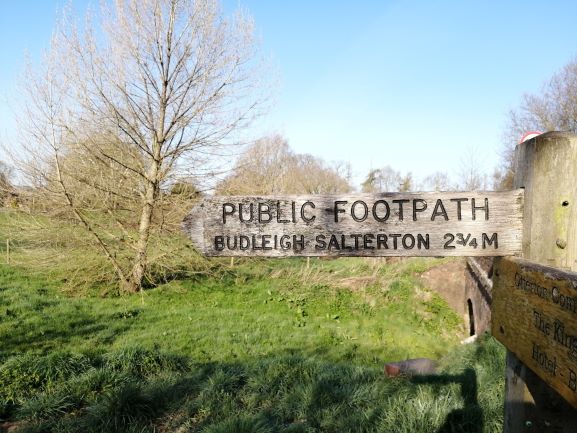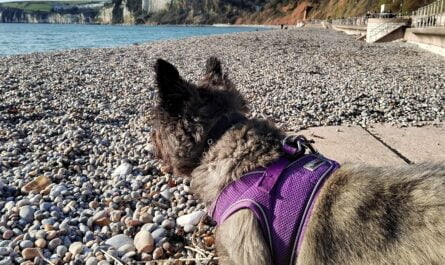Last Updated on 29/06/2025 by Claire Coney
Do you want to explore some of the best scenery in Devon with your dog? Then you should try the dog-friendly Otterton to Budleigh Salterton walk. The walk is about 5 miles (8 km) long and takes around 3 hours to complete.
You will start the dog-friendly walk in the picturesque village of Otterton, located 3 miles (5 km) south of Sidmouth and 10 miles (16 km) east of Exeter. Otterton has a historic mill, a beautiful church and a peaceful setting by the River Otter. You will follow the river towards the sea, where your dog can run free and splash in the water.

Then you will join the South West Coastal Path, which runs along the stunning sandstone cliffs of the Jurassic Coast. You will see Ladram Bay, which has distinctive red rock formations and a pebble beach. You can also spot some wildlife, such as seals, dolphins and seabirds.
The final part of the dog-friendly walk takes you back to Otterton through peaceful country lanes, where you can admire Devon’s green fields and hedgerows. I would suggest wearing walking boots as the route can be muddy.
Eatery’s Along the Route
If you get hungry or thirsty along the way, there are some cafes and restaurants near Otterton or Budleigh Salterton that you can visit. For example, you can stop at Otterton Mill Restaurant, which serves homemade food using local ingredients and has a lovely garden by the river. You can also try The King’s Arms, a cosy pub in Otterton that offers a tip-top Sunday lunch and a friendly atmosphere. In Budleigh Salterton, you can find Wesley’s at Budleigh, a cafe that serves delicious Devon afternoon tea and a lovely lunch. Or you can go to Budleigh Fish Cafe, which offers fresh fish and chips on the beach.
The Otterton to Budleigh Salterton walk is one of my favourite dog-friendly routes. I hope you and your dog will have a wonderful time!

The History of Otterton
Otterton is well known for its pretty thatched cottages. These little houses have thick whitewashed cobb walls. The cottages nestle in the beautiful Otter Valley. Otterton Mill is one of the oldest working water mills in the country. It has been on this site for over 1000 years. Otterton Mill is well worth visiting. You can experience the ancient tradition of flour milling and bread baking. You can also visit the café, shop and art gallery at the start or end of your walk.

From the Saxon to the Tudor times, Otterton was a successful port, and the village was alive with activity. Over time, the river mouth became silted by shingle. This made it difficult for boats to navigate upstream. In the 16th century, a huge storm raged, washing stones into the estuary. The river mouth became blocked by a solid pebble bar and could no longer be accessed by the boats. The railway line came to Otterton in 1920. This made the port redundant; however, it gave the town a boost in popularity as a holiday resort.
In the 16th century, the dissolution of the monasteries arrived at Otterton Priory. King Henry VIII’s men sacked the Priory to the ground. The Priory was almost destroyed, but the distinctive tower was left standing. In its place, the Victorians rebuilt a church. The tower is now situated at the east end of the nave.
During the Napoleonic Wars, prisoners were held at Otterton. They helped the villagers to reclaim the salt marshes for agricultural use. The villagers became farm labourers and are still farming the pastures today.

1. To Start The Dog-Friendly Otterton to Budleigh Salterton Walk
Walk west along Fore Street, passing Otterton Mill on the left-hand side. Cross over the old Stonebridge. Then turn left following the footpath south on the west bank of the River Otter. In just under 1 1/2 miles, you will reach South Farm Road. Turn left and cross over the bridge to the other side of the river. A few metres along the road to the right, you will find a footpath. Head south. This stretch of the route follows the South West Coast Path. It is one of East Devon’s most beautiful walks. The prehistoric coastline is part of the newly named World Heritage site. This path heads south to the mouth of the River Otter on the coast.

The River Otter Estuary
The River Otter Estuary is a nature reserve and a site of special scientific interest. It consists of salt marshes, reed beds and low-lying meadows.
The Otter Estuary is a fantastic place to see lots of birds nesting in the summer. Many more birds use the estuary during the winter months. Cormorants and Brent Geese can be seen wading along the estuary. Songbirds such as thrushes, finches and warblers flourish in the hedgerows.
Wildflowers and grasses are abundant. They attract dragonflies, butterflies and many other insects. The swallows and swifts swoop down to pursue the insects. Kingfishers hover over the river in search of trout. The river is also famous for the family of beavers that have made the riverbank their home. They have been present on the river since 2008. The best time to see them is on a summer evening.

2. Continue The Dog-Friendly Otterton to Budleigh Salterton Walk
At this point during the walk, you can look back across the river. You will see the red Triassic sandstone of the west cliff through the tall pine trees. Also, this is a great place to pause for a moment. Take in the stunning views of Budleigh Salterton before continuing the walk northeast uphill.

Budleigh Salterton
Budleigh Salterton’s name comes from the manufacturing of salt. The people of the town made their living by panning salt for the Abbot of Otterton Priory. The salt was made in large round pans. These salt pans were constructed by the River Otter. The Abbot also owned the pack horses that transported the salt to nearby towns and villages. Salt panning here goes back to Roman times and continued until the 18th century.
Flat-bottomed boats carried limestone to Budleigh Salterton. They landed near the estuary at high tide and unloaded their cargo. Three kilns burned limestone at the river mouth until 1875. The kilns produced mortar, which was used for building in the nearby villages.

The Red Cliffs
The red cliffs to the west of Budleigh Salterton’s beach are the remnants of a desert landscape that existed 240 million years ago in the Triassic period. Back then, huge rivers carried pebbles and cobbles across the arid terrain and deposited them in layers. Over time, these layers compressed into the rocks that form the cliffs today. The red cliffs to the west of Budleigh Salterton’s beach are the remnants of a desert landscape that existed 240 million years ago in the Triassic period. Back then, huge rivers carried pebbles and cobbles across the arid terrain and deposited them in layers.

Over time, these layers compressed into the rocks that form the cliffs today. The red cliffs to the west of Budleigh Salterton’s beach are the remnants of a desert landscape that existed 240 million years ago in the Triassic period. Back then, huge rivers carried pebbles and cobbles across the arid terrain and deposited them in layers. Over time, these layers compressed into the rocks that form the cliffs today. The cliffs provide the source of the pebbles and cobbles that cover the beach. The waves and tides constantly wear away the rocks and break them into smaller pieces. These pieces are then carried by the water and deposited on the shore.

3. Continue The Dog-Friendly Otterton to Budleigh Salterton Walk
At this point, the walk follows the clifftops for about another 2 miles. It passes several points of interest. Danger Point, Blackhead, Brandy Head, Crab Ledge and Chiselbury Bay.
The Southwest Coastal Path
The old coastal names reveal a secret history of smuggling in the 18th century. Smugglers used to sail to France and bring back barrels of Brandy and other illegal goods. They hid the barrels in caves and tunnels along the coast to escape the Taxmen. But their luck ran out during the Napoleonic wars. Some of the signal stations betrayed the smugglers and told the Taxmen about their activities. The signal stations got a cut of the loot as a reward.

Rectory of East Budleigh
The Parish Room at the Rectory of East Budleigh was more than just a place for the vicars to meet and pray. It was also a secret storage for smuggled goods that the vicars helped to bring ashore from the Otter estuary. The room had two hidden exits and a tunnel that connected it to the church, allowing the vicars to move the contraband without being seen. The vicars were part of a network of smugglers that operated in the area, taking advantage of the secluded coast and the trust of the locals.

The old coastal names hold a secret! In the 1700s, some daring sailors went to France and came back with Brandy and other illegal goods. They hid the barrels in caves and tunnels so the Taxmen wouldn’t find them. But their luck ran out when the Napoleonic wars started. Some of the signal stations betrayed the smugglers and told the Taxmen about their activities. The signal stations got a cut of the loot as a reward.

4. Complete The Dog-Friendly Otterton to Budleigh Salterton Walk
The walk turns inland, but you will see Ladram Bay caravan park in front of you. Also, you will have breathtaking views of the coast to Sidmouth and beyond. Follow the footpath along the edge of the field. (Detour – you can walk to Ladram Bay. You will be able to see its beautiful rock stacks and pebble beach before returning to the path junction.) The inland path joins a track that leads to a small Lane. Turn left along the tarmac lane, upon reaching the Farm, turn right. At the T-Junction, turn right, walking down the hill into Otterton to complete the dog-friendly walk

Alternative Start Point For The Dog-Friendly Otterton Walk
An alternative start to the dog-friendly Otterton walk is from the East car park at the seafront in Budleigh Salterton. From here, take the South West Coast Path. Head north along the River Otter to the bridge mentioned in the description above. You can then follow the walk as described.
Enjoy The Dog-Friendly Otterton Walk
The dog-friendly Otterton walk is one of my all-time favourite Devon routes. It is a route that I could walk every day and never tire of the stunning views. I hope that you and your dog enjoy this route as much as I do. I would love to hear about your experience on this walk. Please comment in the box below.

| Is the Otterton walk Dog-Friendly? | Yes. Dog bins are provided along the river. |
| Length: | 9.20 km – 5.72 miles |
| Time: | 2-3 hours |
| Ascent: | 52 metres – 500 feet |
| Level Moderate: | This walk covers quiet country lanes, flat riverside and rolling coastal paths. Some steep hills. This walk can be muddy in places. Make sure that you take your walking boots. |
| Parking: | Fore Street, Otterton, East Devon, EX9 7JE (approx. location). |
| Facilities: | In Otterton – Shops, Pub, Café. |
Further Reading About Dog-Friendly Devon
5 of the Best Dog-Friendly Attractions in East Devon
Try Seaton in Devon for All-Year-Round Adventures!





